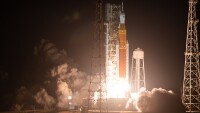“Alexa, where’s the nearest coffee shop?”
In vehicles with Alexa, drivers can pose questions like that — while keeping their eyes on the road and hands on the wheel. Amazon’s cloud-based voice assistant technology works with the car’s navigation system to figure out where the nearest coffee shop is and guide drivers to it.

Interactions like this hinge on the ability of the built-in hardware and software to accurately detect when Alexa is invoked.
“We want to take the Alexa experience that customers are familiar and comfortable with in the home and extend that experience to cars,” said Jinghao Liu, a principal hardware engineer with Amazon Smart Vehicles at the team’s vehicle lab in San Jose, California.
The challenge is that cars are a different acoustic and operating environment than a home. They are noisier, for starters. What’s more, the bulk of customer needs in a car are location-specific and tied to real-time road, traffic, and weather conditions. And, as most drivers know, cellular service in a car is never 100% reliable, especially outside of cities and towns.
There’s another complication: the hardware. Amazon scientists often work with car manufacturers on the design and implementation of their systems, but during validation in the 6,000-square-foot vehicle lab, there is one element they cannot control for.
“We are giving our partners access to Alexa services and functionalities, but we don’t make the device,” explained Parimal Tathavadekar, a senior manager on the Amazon Smart Vehicles team. “We make sure that the integration of our technology with their device is correct and happily working.”
Tackling road noise
Perhaps the biggest difference between speaking to Alexa in a car versus at home is the increase in noise, Liu noted. Think of the rumble from tires on the road and turbulence from the wind, as well as whatever radio station, podcast, or music is playing through the stereo.
To invoke Alexa, the car’s microphones need to pick out the speaker’s voice from this din and send the voice signal to the automatic speech recognition model running in the cloud.

In design meetings, Amazon scientists collaborate with car manufacturers on techniques that allow the car’s built-in system to focus on the person speaking to Alexa and cancel out acoustic echo and background noise.
For example, Amazon scientists recommend car manufacturers use a signal-processing technique called beamforming that steers microphone arrays toward a voice signal coming from a particular source, such as the driver, while suppressing audio interference from all other directions.
“You are laser focusing on just that one angle,” Liu explained, adding that beamforming is used in the Amazon Echo family of devices.
Another recommended technique called acoustic echo cancellation blocks out the noise from the car’s speakers so that music played by the speaker does not interfere with the customer requests. Manufacturers can also deploy various noise reduction algorithms, which learn to separate a speaker’s voice from other background noise.
Inside the vehicle lab, Amazon scientists use software and acoustic tools to simulate road noise, music, and other acoustic elements as they test and validate Alexa integration with the car manufacturer’s built-in systems.
To achieve certification, the built-in system must stream a voice signal to the automatic-speech-recognition model that’s of a similar quality to the voice signals streamed from any of the other hundreds of millions of Alexa-connected devices around the world.
“This model is serving millions of devices at home and on the go, so we make sure that the received audio signal is reasonable, and our cloud takes care of the rest,” Liu said.
Personal mobility
Customer interactions with Alexa in cars are often location-specific, ranging from queries about points of interest along the way to driving directions that avoid traffic jams.
Amazon does not have its own navigation system or a proprietary database of points of interest, noted Tathavadekar.
Rather, Alexa AI is designed to resolve a speaker’s query and hand off such intents to the car’s navigation engine for geolocation information. Alexa uses this data to interact with third-party databases for information about points of interest.
The use of Alexa in conjunction with a car’s native navigation system enables drivers to accomplish tasks via voice instead of “having to type or touch through different navigation screens, which can be a distraction,” Tathavadekar said.
The contextual awareness also allows Alexa to deliver experiences such as tuning in to local radio stations on a cross-country road trip.
Inside Amazon’s vehicle lab, engineers simulate vehicle locations, Liu explained, validating that Alexa is integrated with the car’s navigation system and able to provide relevant information and experiences to customers on the go.
Staying connected
Quality of connection is another factor in how quickly a device can connect to Alexa and get a response.
“When you’re driving, you’re going to go through a patch with poor reception,” Liu noted. That’s why he and his colleagues also test how built-in systems handle scenarios with poor, or no, cellular signal.
In today’s world, customers are used to getting a quick response from Alexa at home, Liu noted. If the response takes longer on the road, the customer may think the device is defective. That’s why Amazon makes sure that Alexa stays connected to customers, even when the cellular signal is lost.
For example, Alexa’s local voice control of native features in the car such as adjusting the air conditioning, tuning the radio, opening the sunroof, and turning on the reading light do not require a connection to the cloud.
In the vehicle lab, the team measures the built-in hardware device’s latency with various levels of connectivity. If the cellular signal strength is strong, but Alexa is slow to respond, that may be an indication that the hardware needs to be re-engineered.
As connectivity becomes ubiquitous, Liu added, the latency expectations will continue to tighten. Amazon scientists also expect that experiences within and outside of cars will become more engaging and complex going forward.
“Every year, we’re adding new features and equipment to our test arsenal,” Liu said.
Making it personal
The Alexa experience in a car should also be as personal as the interactions that customers have with Alexa in their homes, noted Tathavadekar. That’s possible because cars with built-in Alexa are just another endpoint for individual Alexa accounts, which are stored in the cloud.
“We are able to render experiences on all the endpoints where that particular person might be operating,” he said. “You might create a playlist at home and play it in your car.”
In a similar fashion, a driver in their car can ask Alexa to add an item to a shopping list that they started in the kitchen or ask Alexa to lock the front door of a connected smart home.
Providing that personal and familiar experience with Alexa in cars requires a system that seamlessly extends the Alexa experience from an Echo at home to a vehicle that might be traveling down a congested highway with patchy connectivity.
“The big chunk of our work is to collaborate with the major car manufacturers to create unique experiences that delight car owners,” said Liu. “They are our partners who help deliver the product to customers. They’re making the car, and we add this piece of personalized voice assistant into the digital experience.”




















